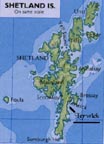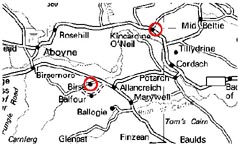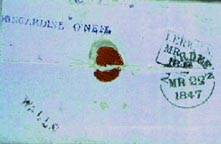Eunice and Ron Shanahan have shared with readers of the Victorian Web this material from their website, Letters from the Past. Click on thumbnails for larger images.
Postal Markings
This letter was written by John Rannie of Walls, in the Shetland Islands. It was dated Mar 10, 1847, addressed to The Revd George Smith, Minister, BIRSE Aberdeenshire. The postmarks show the route taken over the 12 days.



From left to right: (1) The Shetland Islands (click on this thumbnail for a larger image). (2) Map showing the location of the town. (3) a really neat, dark blue name stamp of KINCARDINE O'NEIL. When I first saw this I bemoaned the fact that some moron had ruined the cover by stamping his name on it as a sign of ownership. However, when I looked up the list in Alan Robertson's book, there is was - a Scottish Post Town!



From left to right: (1) WALLS name stamp applied in black ink; (2) LERWICK boxed datestamp, also in black ink; (3) detail.

ABERDEEN circular datestamp MR 22 1847.
The Letter
The letter is rather faded, but perfectly legible and well written, and concerns his son's suitability as a schoolteacher.
Revd & Dear Sir,
I received your favour of the 25th Ult & I observe what you say respecting the probable issue of matters as regards your vacant School. The only objection you seem to have to my son, is that he is a mere youth on account of which he would be unfit for the inspectorship of the Poor.
That he is young I acknowledge as he was born in Dec 1826 & you may remember that you baptised him, but you may believe me when I state that he is not a youth in judqnent & good sense & I hesitate not to say that you would find him possessed of discernment, prudence & solidity far above his years & I have not the least doubt but he would be fully competent to fill the office of Inspector of the Poor, & would discharge all its duties to your entire satisfaction.
That he would be a great acquisition to the Parish & yourself as your Schoolmastar I humbly believe, & I hope you will not think I say this from any foolish fond partiality of a father or from my own knowledge of him only, but I say it from the authority of others who are more competent judges of these matters than myself. You are better acquainted with, me than to suppose that I wrote you for the purpose of praising my son or taking praise to myself, for when there is no merit there can be no praise & you know l can have no merit at all in the matter as it was not I but God who gave him the superior powers & ability he possesses.
It is my prayer to God that He would grant him grace to keep & guide him & enable him to improve aright his gifts & endowments, but my object is to assure you that you need have no fear of his youth which as you very justly observe would in most cases be a sufficient objection to holding the office of Inspector of the Poor for you know as well as I that there are many youths possessed of literary talents & acquirements who notwithstanding would be very unfit for the office.
After what you have stated, it is needless for me to say anything more than that I would have been glad had he got to be your Schoolmaster, as there is no minister of my acquaintance whose value & worth I regard more or who I am sure would be more friendly and useful to a young man than yourself, both as regards principle and practice, precepts and example & I state not this out of flattery but from my own firm conviction & real belief.
I am sure you would give him your vote & Support were there any prospect of success. Sometimes the choosing and appointing of a Schoolmaster is left almost entirely to the Minister of the Parish, as he has so much interest in the matter, as any writer can have. I think I mentioned to you that my son would obtain ample certificates from the Professors.
Especially from Prof. Scott with whom I had a conversation about him when I was last at Aberdeen, and he told me that my son John was an honour and a credit to me and his present employer Mr Micklejohn will be ready to give his testimony to his abilities and success in teaching and his happy method of instructing youth.
The next part of the letter describes the dreadful state of poverty to be endured in the Shetlands in the year 1847.
You wished that I had given you some information respecting the state of Shetland. Perhaps it is not so bad as has been represented in the newspapers, although there is much poverty and want throughout the country amongst some, and this I may say is the case every year as there is but too much laziness and imprudence. The failure of the potato crop is a great calamity in this country because the potatoes furnish at least two thirds of their living in the island of Papastour in this Parish with a population of 367 there are no potatoes and the inhabitants will be most miserable as they have scarcely any crops.
I could not be sure that this word was Papa Stour, as I could not find such an island on my atlas, but the Shetland Is Tourist Office kindly sent me a pamphlet which showed the island. Mr Rannie then continues....
I state with truth that at this date throughout Shetland the most part are without potatoes either for food or seed and their sole dependence is on the fishing, and it is seldom the weather at this season for prosecuting it, so that unless supplies come from the south there will very soon be great destitution.
We have had a subscription among the clergy and merchants in this place for the destitution fund Edinburgh, amounting to L9 11s.6d and we expect a supply of meal down which is greatly needed as there is none to be had here. I have no room to enlarge.
With best respects to your sisters and yourself, in which Mrs R. joins,
I am Revd and Dear Sir Yrs Truly
John Rannie.
This description of the failure of the crop and subsequent shortage of food, may well have been a contributing factor to the emigration from the Shetlands in the mid 19th Century to any other promising land. It also puts the 'poverty' of the 1990s in perspective!
Last modified 30 May 2010